Robert Rodriguez Shorts Interview
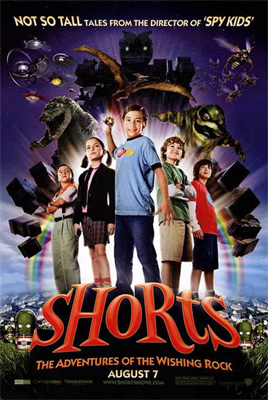
RODRIGUEZ SHOWS CHILDISH COMEDY SENSE IN SHORTS.
Robert Rodriguez, Shorts Interview by Paul FischerThere's no denying that Robert Rodriguez is a true auteur. Director, cinematographer, editor and composer, he defies and bucks the Hollywood trend. His latest film, Shorts, returns the iconic filmmaker to family film territory, in this story of a wishing stone that near destroys an outwardly idyllic community. Paul Fischer spoke to the director about Shorts, technology and future projects including Machete, which he is currently shooting.
QUESTION: When you decide that you're going to do a kids' movie, do you do that for the child within you? I mean, is that the attraction for you, to go from - I mean, you're about to do Machete next, which is the complete antithesis of this film. Why?
ROBERT RODRIGUEZ: They're not that far off. [LAUGHTER] They actually - you know, people think - you know, I do my kids' movies, and I do 180 degrees from that. But it's not like I'm doing Shorts and Seven. You know, it's more like Shorts and - you know, The Desperado, and these things with missile cases - guitar cases that shoot missiles. And so they're very much from the cartoonist's hand. I used to be a cartoonist. So, the common thing in all my movies is, they're all fantasies. They're all made-up worlds. They all had a lot of humor. Even Dusk Til Dawn, which is a vampire movie - it's a lot more comical than serious. And even the gore is - I remember when I did Desperado. You know, so many people die in that movie. And Quentin's Reservoir Dogs came around at the same time. He got - you know, taken to the cleaners by the critics for not showing an ear get cut off, just because it's such an intense, serious thing. It happens off-camera. And in mine, people get mowed down right and left, and I'd come to these sort of round-table interviews, they go, "This is my kind of action movie, this is my kind of violence." You know, because there's a fun spirit to it, so it's a different kind of - more of a comic book feel. So-but there's still a difference, yeah. I find making movies like Grindhouse or Sin City and - one kind of movie, they're still very creative and fun. And then these movies take advantage of my family experiences, because I grew up in a family of ten kids. I have five kids. When people say as a writer, "You want to go write a book or a script, write what you know." So, I have to do these, because that's what I know. It would be robbing myself of all this time spent with my kids, to not utilize some of those experiences and those ideas that we come up with, just playing, and not put it somewhere.
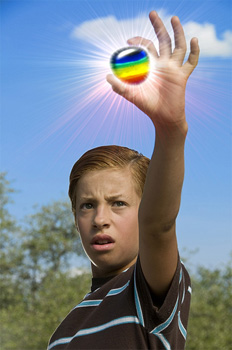 QUESTION: What aspect of your childhood is inherent in this movie, then?
QUESTION: What aspect of your childhood is inherent in this movie, then?ROBERT RODRIGUEZ: Well, those are more in the Spy Kid movies. In these, this is more of my life with my own children these past few movies have been, based on that. I mean, just directly, I just - we have a canyon full of snakes that are in our house, and our property. We have a castle turret part of the house that I had built thinking, ten years ago, when I built it, that someday I was going to use it as a set for a movie with - when I had kids, with my kids. And then it ended up happening with this. I was going to shoot it kind of like El Mariachi, just kind of in my backyard, and come up with a storyline later. And so when my son came up with the idea to do a Little Rascals-type movie, it was like, "Of course. That's something I had thought of doing years ago, and I totally forgot about it." And - he would talk about the canyon, and a rock. He loves rocks, he collects rocks. He kept saying, "A rainbow rock, a rainbow rock." So I thought, "What if it's a wishing rock," and asked him what he would wish for if he could wish for anything, because I was going to test the idea on them. He said, "I wish for a butt for a head." [LAUGHTER] I said, "Are you sure?" And he says, "Yeah." So, I asked my other son, who's older and wiser. I asked him what he'd wish for. And he said, "I'd wish to be a potato." So I said, "Hmmm. Okay, I'd wish for a million more wishes." And then their faces kind of dropped, like - "Oh." You could tell they were thinking, "Oh, I just wasted my wish." [LAUGHTER] And I realized, "Oh, this is a great idea for a movie." Because - yeah, you get a rock and it can make you have anything, you wouldn't really know what to wish for at first, especially a kid. "A never-ending supply of chocolate." Now he's got stuff shooting out of his pockets. And - "Let's wish for telephon-esis," and of course he says the word wrong, and everything's taken literally, and you can just have a lot of fun. So. It just became a process where me and my kids, over the course of a couple years, would just be sitting around the dinner table, and I'd be thinking of ideas, or they would come up with ideas. "What if - you know, I was trying to keep the rock away from the kids at one point, and he asked for long arms, and his arms grow really high. And then a girl crawls up like a spider, and grabs it. She's invisible, she takes off. She hides in a toaster, and the toaster goes jumping around. You know. If an idea worked, I'd write it down. If it didn't, I would forget about it. [LAUGHTER]
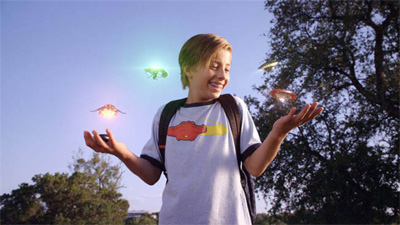 QUESTION: I was just wondering for you, everybody talks about how good you are at working with kids, and you can have them in your movie, and on the set, and just around you all the time. Are you just an exceedingly patient man? I mean, how do you do it?
QUESTION: I was just wondering for you, everybody talks about how good you are at working with kids, and you can have them in your movie, and on the set, and just around you all the time. Are you just an exceedingly patient man? I mean, how do you do it?ROBERT RODRIGUEZ: I was third-oldest in a family of ten kids. I do have a very vivid memory of an only child friend of mine coming over in high school on a Saturday. And h he was just bugging out. And I said, "What's up?" And he said, "How can you stand the noise?" And I just - "What noise?" And I listened with his ears for a moment. I got real quiet. Like, "Oh, yeah, I guess it is noisy in here. I just don't know it - I just grew up this way." I don't actually hear it, you know? I actually don't hear it.
QUESTION: You mentioned that comic-book sensibility. I was talking to James Spader before, and here you've got an actor who is known for roles that are kind of internal. And you're telling him, "No, bigger. Bigger. Louder." You know, "Open wide." Is that a process that you have to go through, to get people to go over-the-top? Because it seems as though - especially in your kids' movies, too big is not big enough.
ROBERT RODRIGUEZ: Yeah. A lot of times, to get that factor, and - he knows I'm in close. I mean, the camera's right there close. He's just like, "I don't know." You know, that's why you have a director. You're just trusting them. And you know what feels right, you know where you usually go, in your comfort zone. You're like, "Do I go here? I don't want to look like a fool." Like, "Dude, I'm the editor. It's going to be fine. Let's go watch." And that's what's so great about shooting digital. Is, you've got a big monitor. Very clear. It's not like-when you usually shoot film, you can't tell what you're doing. That's usually what he's shot on before." And so he can come over and see in crisp details, if we're at the premiere, exactly what you're going to see. He was howling. He just thought - he couldn't believe it. He just didn't know that it was reading that way. It looked great.
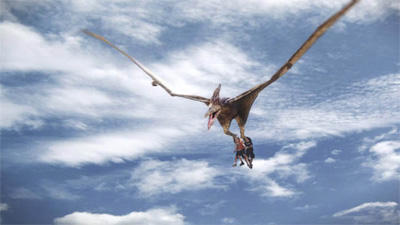 QUESTION: I was very surprised that when he was given the script, given the nature of his character, I don't think he believed it would be possible for him to finish shooting this in five days. How do you achieve that? And has the technology reached the point where that is even more possible no than it was when you did your first digital movie, the Spy Kids movies?
QUESTION: I was very surprised that when he was given the script, given the nature of his character, I don't think he believed it would be possible for him to finish shooting this in five days. How do you achieve that? And has the technology reached the point where that is even more possible no than it was when you did your first digital movie, the Spy Kids movies?ROBERT RODRIGUEZ: No, actually, that was pretty quick, too. [LAUGHTER] I think the thing is, it's very important - I'm my own editor. And that's just a huge difference. I mean, the more jobs you do, the easier it gets. And that sounds kind of crazy. It's like, "Come on, we're going to make a big movie. Let's get more people." It's like - no. You need to get less people. You'll actually finish the race, instead of, like, just having a heart attack before you get across the line, because otherwise, you're just carrying all this extra baggage with you. So, by - if you just think of the process, if you're just the director and you don't know anything about editing, you're just shooting shots for the editor to figure out - well, then, you're going to be - you're going to be getting a close-up, then you're going to be getting a medium shot, then you're going to be getting an overhead shot. It's like, "Well, what else can we do? Let's get an over-the-shoulder. Let's get an under-the-shoulder. Let's get a lalala." Well, you just wasted a whole three days shooting something that could have taken ten minutes, if the editor was right there. And if the editor's the same person, even easier. So, you're watching a performance, and you're going, "You know what? I got that. That's what I'm going to use. Let's move on. And in fact, I can already tell, because it's a big party, you don't have to be there during the whole party. I'll just film your scenes, and then I'll make it look with the editing like they're actually looking, talking to you. And watching you talk. Even though I'm not going to film them for three more weeks. And it's going to look pretty seamless, because I'm also the guy lighting it, so I'll light it so that it looks like it's the same light." So. Nobody else will remember quite that that's where you had the lights, but I'll remember. Because I'm the one doing it.
So, you save a tremendous amount of time. And it's just a very efficient approach to making a movie.
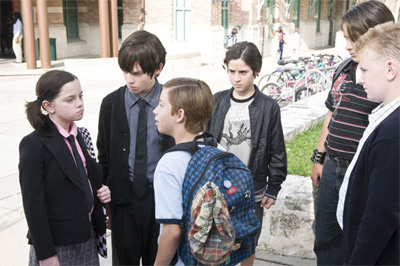 QUESTION: But, how easy has it been for you to resist the people throwing bags of money at you? Saying, "Okay, good. Make that big picture with the editor later, and the composer is somebody else, and just be the director."
QUESTION: But, how easy has it been for you to resist the people throwing bags of money at you? Saying, "Okay, good. Make that big picture with the editor later, and the composer is somebody else, and just be the director."ROBERT RODRIGUEZ: It's never happened. The only time it started to happen was on Barbarella, and it was funny, because Dino's very old school. He didn't know that I was my own editor and production designer. He'd never heard of that. You know, he's been making movies forever. And he just wanted the best, so he just said, "We can get a big budget from here, and Germany's going to give us $70 million," or whatever. "And you can be - we'll get you the best production designer, the best cinematographer." So I'd go to try to get a cinematographer, even, and they would just - "Why are you talking to me? You do a really good job." Nobody believed that I wanted them to work with me. And it's like, "No, I want to get new ideas anyway." They probably thought they'd just strong-armed or something. So, no one really wanted the job. But then when I did have a production designer, he was really talented, but then he had to go leave and do another movie. And then after a while, it became - you know, going, "Would you mind just taking over that job?" And it's like, "That's what usually happens. We can't really find a good editor. Can you edit?" They'd say, "Yeah, that's what I usually do." So it kind of slowly goes back to how it always was anyway. So. I just end up keeping it there. It's just a very efficient - you know. Someday maybe I'll be able to afford to hire the best. I'm not the best at those jobs. I just - I know there's an efficiency to it that you get.
QUESTION: Could you talk about the casting process? The kids are so good.
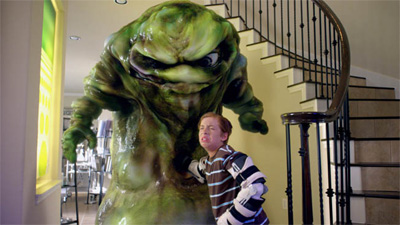 ROBERT RODRIGUEZ: It's not real difficult to find kids. I mean, I have a really great casting agent. She brings in a bunch of kids. She brings me only the best ones of the best, and then you kind of watch. And you can see the ones that you spark to. And then you kind of just find places for them. You kind of shuffle them around. Like, I really wanted to use Loogie. He read for every part. And I couldn't quite figure out - and finally I just made him Loogie. And then the kid who plays the one with the long hair, slicked back, the booger kid - he came in for every part. I knew I needed to put - his name was even Short. That's his name, is Short. Jake Short. I thought, "He's destined to be in this movie, somewhere." And I couldn't fit him in anywhere. He just didn't fit anywhere. Finally, the last person to be cast was that kid. And he showed up one day for an audition with his hair slicked back, because he looks like those surfer kids. He's just so cool. But he made himself a nerd, and put on glasses. I said, "Okay, you get the part, just because you're being creative, and trying to play outside of the box." And then you work with them after that, and you already know that they're able to do it. And it's just going to be a day to day thing, where you work with them scene by scene, line by line.
ROBERT RODRIGUEZ: It's not real difficult to find kids. I mean, I have a really great casting agent. She brings in a bunch of kids. She brings me only the best ones of the best, and then you kind of watch. And you can see the ones that you spark to. And then you kind of just find places for them. You kind of shuffle them around. Like, I really wanted to use Loogie. He read for every part. And I couldn't quite figure out - and finally I just made him Loogie. And then the kid who plays the one with the long hair, slicked back, the booger kid - he came in for every part. I knew I needed to put - his name was even Short. That's his name, is Short. Jake Short. I thought, "He's destined to be in this movie, somewhere." And I couldn't fit him in anywhere. He just didn't fit anywhere. Finally, the last person to be cast was that kid. And he showed up one day for an audition with his hair slicked back, because he looks like those surfer kids. He's just so cool. But he made himself a nerd, and put on glasses. I said, "Okay, you get the part, just because you're being creative, and trying to play outside of the box." And then you work with them after that, and you already know that they're able to do it. And it's just going to be a day to day thing, where you work with them scene by scene, line by line.QUESTION: How violent a film is Machete going to be? Is it going to be as tough and as intense as the trailer that you did for that movie?
ROBERT RODRIGUEZ: It'll only be as violent as it needs to be. I don't think it'll be excessively violent just for that sake. I think it's - it will be surprisingly good. [LAUGHTER] I mean, we've been shooting this week, and it's just - it's just elevated from what you think it's going to be, by so much, that I think the main note people will have watching it is, like - it delivered way beyond what it needed to deliver to make me happy.
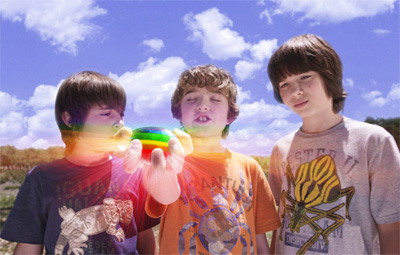 QUESTION: You just finished announcing the cast. Any more people that you need to cast?
QUESTION: You just finished announcing the cast. Any more people that you need to cast?ROBERT RODRIGUEZ: Yeah. We still need to cast a few more people. I don't have them yet. We're still only - we've only shot one week. But I need to cast them soon, because some of these people shoot next week. A couple of main characters we're still casting.
QUESTION: I remember when I talked to you for Grindhouse, you said making those trailers was the most fun, because you're basically doing the best scenes from every movie. So, how about taking a trailer, then, one of those fun trailers, and expanding it out to a movie? Was filling in the blanks more of a challenge than you expected it to be?
ROBERT RODRIGUEZ: Only because I was really holding myself to keeping the footage that was shot. So it's like - I came out - "How did you get those girls in the pool?" And so you back up from there - because I want to still use that, because that's going to be the fun of it. Is like, "How did he work that-oh, I see." And it's a real great creative challenge, and it's really funnier to see how that pulled it together.
QUESTION: Will that original trailer be in the marketing campaign for the feature?
ROBERT RODRIGUEZ: Well, all that footage is in the movie. I'm using that footage that we shot two years ago, actually in the movie, and we're bridging around it. So, I'm not reshooting that stuff. So, that's what's funny.
QUESTION: We heard Lindsay Lohan, you were thinking about casting her in the movie?
ROBERT RODRIGUEZ: She's one of the people in the movie, yeah.
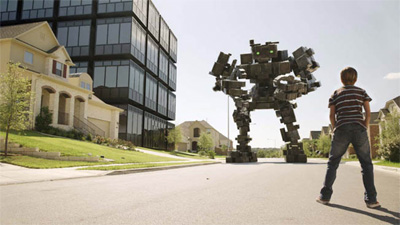 QUESTION: What's the character's name?
QUESTION: What's the character's name? ROBERT RODRIGUEZ: Her name is April. She's the daughter of one of the bad guys. I can't say too much.
QUESTION: Are you giving her plenty of notice, too, as to when to appear on set?
ROBERT RODRIGUEZ: Oh, she's already been there. I already shot some great stuff with her. Yeah, I shot her on Wednesday. She was fantastic.
QUESTION: Have you seen The World's Greatest Dad as yet? It's the new Robin Williams movie.
ROBERT RODRIGUEZ: No, and my boy is in it. My spy is in it. Tell me.
QUESTION: Check it out. Because the language he uses is a little bit more colorful than the language he used when he was a spy kid.
ROBERT RODRIGUEZ: Oh, no, no. Only on-camera. Off-camera, that's how he always talked. Ever since he was six. The boy's born for that role.
QUESTION: Talking about kids and humor - one of the things that I admired is, kids love body humor. Body function humor. And - you know, certainly having a booger eight feet tall, or whatever, is a great laugh. But you don't go for the lowest stuff. I really admire the fact that there's not - I don't remember there being a fart joke in the movie. Did I miss it?
ROBERT RODRIGUEZ: No, I don't know that there's a fart joke in there.
QUESTION: Yeah. And to me - I mean, that's always a cheap laugh. And I know the kids are going to laugh at it. But is there a certain - I don't know, a level of taste that you want to maintain when you're doing kids' movies?
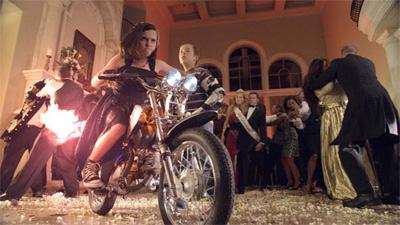 ROBERT RODRIGUEZ: No. [LAUGHTER] It just turns out that way. No - I like a good fart joke. But - no, I think it's - yeah. I mean, there's so much other humor to be had, that I think that was one of the better reviews I think Roger Ebert gave for Spy Kids, was that - at a time when there really weren't any kids movies being made - no one was really taking it seriously, and it was always like, a studio needed a kids' movie, let's just make something really quick and put it out there. And there was a movie about a dog or something, and it was just all poop jokes and stuff. So, they weren't expecting something like Spy Kids, where it's like - "Wow, somebody actually looked like they wanted to make a family film, and set something in this age, where it's about what you could get away with, instead of what you could aspire to." You know, "This movie's a gem," or something like that. And so it was like, a really good - that was a good route to go, was to try to just make a good movie. And you forget - I think the other ways were just ways to just kind of - it was just, throw in the kitchen sink. We just want people laughing in the theater, and we don't have anything else to do, so let's just entertain. Anything we can do to just get the laugh. Just make the kids laugh, and the parents will feel like they took their kids out to have a good time.
ROBERT RODRIGUEZ: No. [LAUGHTER] It just turns out that way. No - I like a good fart joke. But - no, I think it's - yeah. I mean, there's so much other humor to be had, that I think that was one of the better reviews I think Roger Ebert gave for Spy Kids, was that - at a time when there really weren't any kids movies being made - no one was really taking it seriously, and it was always like, a studio needed a kids' movie, let's just make something really quick and put it out there. And there was a movie about a dog or something, and it was just all poop jokes and stuff. So, they weren't expecting something like Spy Kids, where it's like - "Wow, somebody actually looked like they wanted to make a family film, and set something in this age, where it's about what you could get away with, instead of what you could aspire to." You know, "This movie's a gem," or something like that. And so it was like, a really good - that was a good route to go, was to try to just make a good movie. And you forget - I think the other ways were just ways to just kind of - it was just, throw in the kitchen sink. We just want people laughing in the theater, and we don't have anything else to do, so let's just entertain. Anything we can do to just get the laugh. Just make the kids laugh, and the parents will feel like they took their kids out to have a good time.QUESTION: What can you tell us about Nerverackers?
ROBERT RODRIGUEZ: That would be done some time next year. It's a futuristic, sci-fi, Blade Runner-type movie, but set in Mexico City in the future. So, it's pretty cool.
QUESTION: That really lends itself to the digital technology that you use.
ROBERT RODRIGUEZ: Yeah. We're looking forward to that. We've already designed a lot of it, and it's - it's really neat.
QUESTION: Will there be a Blinkers movie?
ROBERT RODRIGUEZ: Don't know! They get big so fast.
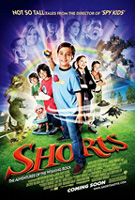
Shorts
Starring: Jon Cryer, William H. Macy, Leslie Mann, James Spader, Jimmy Bennett, Kat Dennings, Trevor Gagnon, Leo Howard, Devon Gearhart, Rebel Rodriguez, Jake Short, Jolie VanierDirector: Robert Rodriguez
Genre: Science-Fiction/Fantasy
Runtime: 89 mins
Shorts is set in the suburb of Black Falls, where all the houses look the same and everyone works for BLACK BOX Unlimited Worldwide Industries Incorporated, whose Mr. Black?s BLACK BOX is the ultimate communication and do-it-all gadget that?s sweeping the nation. Other than keeping his parents employed, however, Mr. Black?s BLACK BOX has done nothing for 11-year-old Toe Thompson, who just wants to make a few friends... until a mysterious rainbow-colored rock falls from the sky, hits him in the head and changes everything.
The Rainbow Rock does Mr. Black?s BLACK BOX one better: it grants wishes to anyone who holds it. Before long, wishes-gone-wrong have left the neighborhood swarming with tiny spaceships, crocodile armies, giant boogers... and outrageous magical mayhem around every corner. But it?s not until the grown-ups get their hands on the Rock that the trouble really starts. Now Toe and his newfound friends must join forces to save their town from itself, discovering along the way that what you wish for is not always what you want.
MORE





